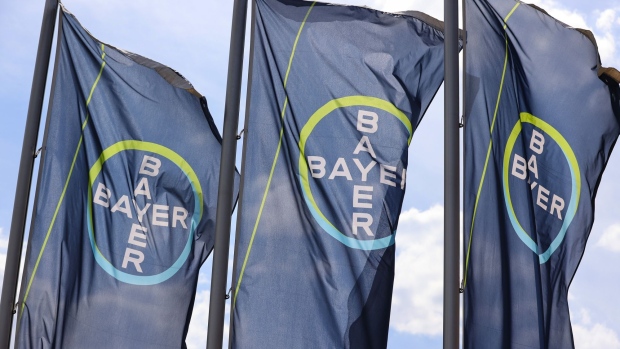Dec 8, 2020
New Bayer Chairman Faces Sour Investors in His First Major Tour
, Bloomberg News

(Bloomberg) -- Bayer AG Chairman Norbert Winkeljohann has spent the last few weeks meeting almost two dozen fund managers during his first major tour of the investment community since taking the job in April. The feedback hasn’t been altogether encouraging.
Several of Bayer’s 25 largest shareholders questioned the timing of the three-year contract extension granted to Chief Executive Officer Werner Baumann in September, given the company continues to grapple with the fallout from the Monsanto acquisition that he spearheaded. Others want Bayer to consider an outright breakup into pharmaceuticals and crop science at some point, saying there are limited synergies between the businesses, according to people familiar with Winkeljohann’s conversations.
The broadside from multiple shareholders highlights their continued unease with Bayer’s strategy a good two years after the German company bought Monsanto for about $63 billion. That takeover has come to be widely viewed as disastrous because, among other things, it saddled Bayer with massive legal bills tied to Monsanto’s controversial Roundup weedkiller, prompting open rebellion from shareholders against senior management. A sweeping settlement that looked within reach just a few months ago remains elusive. Instead, litigation costs continue to rise, weighing on Bayer’s stock price and eating into funds it would need to bolster its pharmaceuticals portfolio.
Bayer’s depressed share price -- it’s the worst performer on Germany’s benchmark DAX this year -- “reflects a lack of investor confidence in the company’s strategy and its resolve to address the pending litigation and depleting pharma pipeline,” said Ingo Speich, portfolio manager at Deka Investment, who was among those who met with Winkeljohann.
Open Rebellion
The company, long coveted for its strong stock price and reliable returns, has faced the wrath of investors unsettled by the Monsanto transaction. The anger burst into the open in early 2019 when shareholders refused to back Baumann at their annual meeting -- a ceremonial rebuke that didn’t force his departure but was still an unprecedented vote of no-confidence in the typically consensual gatherings.
In his meetings with investors, which Winkeljohann conducted mostly virtually because of the coronavirus pandemic, the chairman laid out his case for keeping Bayer whole. At the same time, in some of his conversations he didn’t outright reject a potential shift in strategy or top personnel once the Roundup situation is clearer, said the people, who asked not to be identified discussing confidential conversations.
Bayer said it doesn’t comment on non-public conversations between its leadership and investors.
While it’s not unusual for chairmen in Germany to meet with investors ahead of, say, a general meeting, the scope of Winkeljohann’s roadshow and the discussions about strategy and personnel goes beyond the usual encounters, the people said.
Staying On
Some investors have expressed a desire to let Baumann at the very least see through the Roundup battle. In June, Bayer said it would pay as much as $12.1 billion to resolve U.S. litigation over three Monsanto products. As much as $10.9 billion of that was earmarked for claims that Roundup causes cancer, an accusation that Bayer has repeatedly denied.
The company said at the time that it had reached accords to resolve about 75% of the roughly 125,000 filed and unfiled lawsuits in the U.S. and that the remainder would probably be taken care of in the near term.
But in November, Bayer said it only had Roundup deals that were final, in the process of being finalized or reached “in principle” for about 88,500 cases, a smaller number than the company had indicated previously. Meanwhile, a U.S. judge complained of the slow progress and said he’ll resume federal trials on the matter. That’s a development the company has sought to prevent in its attempt to contain the suits
Still, Baumann should stay on while Bayer negotiates a resolution, said Markus Manns of Union Investment, among Bayer’s top institutional investors. But if the company struggles to return to growth thereafter, a change of leadership should take precedent over major structural change, he said.
“I would prefer new management rather than splitting up the company right away,” said Manns, who also met with the chairman.
In some of his meetings, Winkeljohann was confronted with doubts over Baumann’s standing because he has lost their trust in the course of the U.S. settlement talks, the people said.
Profit Warning
It’s a sense that was compounded only three weeks after Baumann’s contract extension, when the CEO issued a profit warning related to troubles with the agriculture division, further depressing an already languishing share price. Bayer has lost about a third of its value so far this year. That gives the company a market value of about 46 billion euros ($56 billion) -- considerably less than what it paid to buy Monsanto.
Activist investor Elliott Management Corp., which disclosed a 1.1 billion-euro stake in Bayer last year, suggested at the time a potential 30 billion-euro upside in case of a breakup, while saying that resolving the litigation challenge is clearly an immediate priority. A representative for the fund declined to comment whether it had met Winkeljohann.
Winkeljohann, a 63-year-old former partner at accounting firm PwC, replaced Werner Wenning this year as chairman of the supervisory board, the panel that signs off on major strategic decisions and reviews senior management positions. Together with Baumann, Wenning was the driving force behind the Monsanto deal to strengthen the crop-science operation and become less reliant on its pharmaceuticals business.
But before Bayer confronts its structure, it must get the Roundup case in order first, most investors told the chairman.
“Regarding separations -- I feel it’s too early to push on this,” said David Herro, a fund manager at Harris Associates, who said he’s generally supportive of Baumann and whose fund is among the company’s biggest shareholders.. “The legal situation has to be dealt with first.”
©2020 Bloomberg L.P.